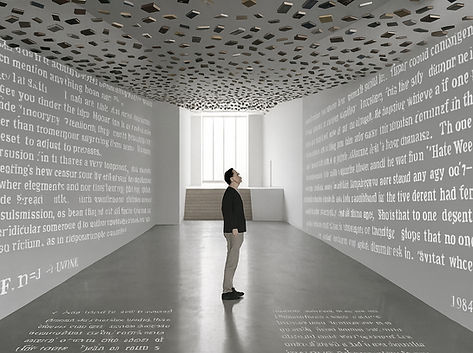

Residency 2026 - 2027
Unbound: The Art of Redaction
Installation of Resistance
Brenda A Andrews
Project Description
Unbound: The Art of Redaction examines the book as both a material artifact and a contested cultural object. The project asks how acts of censorship—through banning, erasure, redaction or distruction—produce not only loss but also new artistic vocabularies. When language is suppressed, visual form becomes an alternative archive: words reemerge as sculptural presence, projection, installation, and sound.Censorship is understood here not simply as negation but as a generative force, one that materially inscribes itself through torn pages, scorched bindings, or blacked-out lines. These interruptions—at once violent and revealing—become points of departure for immersive works that reanimate what was meant to be silenced. In this sense, Unbound extends arguments from book history and critical theory into artistic practice, translating intellectual debates about absence and erasure (Foucault, 1972; Drucker, 1995; Hamilton, 2002; Dettmer, 2012) into lived, spatial experience.
The project draws inspiration from artists whose work foregrounds the material and sensorial dimensions of language. Ann Hamilton’s practice of text—whispered, fragmented, or spatially dispersed—becomes more than inscription: it becomes a medium of collective reflection. Equally significant is Brian Dettmer, whose sculptural excavations of books reveal the layered architectures of language and knowledge, transforming acts of cutting and removal into powerful metaphors of erasure and revelation. Together, these practices underscore how language structures and their suppression reverberate across memory, knowledge, and cultural identity, directly informing Unbound’s investigation into the afterlives of censored language.
The project unfolds across four thematic assemblages:
-
Sacred Texts, Profane Acts – work that examines censorship through strategies of illumination, concealment, and shadow.
-
Political Fire – work that responds to dissident texts suppressed for imagining alternate futures.
-
Eroticism and Obscenity – work that relates to moral censorship, employing fragmented text and sensuous material vocabularies.
-
Contemporary Voices – work that responds to current texts, including narratives of race, gender, and identity.
Plans for the Fellowship
During the 10-month Hodder Fellowship, Unbound will be developed into a cycle of large-scale installations. These works will employ suspended pages, cast paper, translucent textiles, projected texts, and immersive soundscapes of banned passages. Digital overlays and augmented reality interventions will reveal redacted material, allowing viewers to encounter censorship as both rupture and possibility.
The fellowship period will be devoted to material experimentation, conceptual refinement, and the production of a final, cohesive installation in which suppressed texts are reanimated through visual and spatial form. By the conclusion of the appointment, Unbound will stand as an immersive environment that insists on the afterlife of censored language—an archive rendered not in text alone but in space, material, and image.
Urgency in the Present Moment
The contemporary political climate intensifies the imperativeness of this work. Across the United States, book bans and challenges have surged, disproportionately targeting works addressing race, gender, and sexuality. These campaigns reveal that censorship is not a historical artifact but a present-tense mechanism of cultural control. Unbound responds to this condition by making visible what was meant to be erased, treating the very artifacts of suppression as raw material for art. At a time when struggles over access to knowledge and intellectual freedom are again reshaping public discourse, the project positions artistic practice as a form of cultural and political intervention and resistance.
Institutional Context
Princeton provides an exceptional environment for the realization of this work. The university’s rare book and archival collections, rich in censored texts and marginalia, will serve as vital sources for research and inspiration. Equally significant is Princeton’s interdisciplinary community of scholars in literature, history, and visual culture, whose engagement with questions of censorship, authorship, and cultural memory will sharpen the conceptual dimensions of the project.
The resonance with artistic precedents further underscores Princeton as the ideal site for Unbound. Explorations of language as a material, participatory, and spatial phenomenon parallel the university’s commitment to cross-disciplinary inquiry, inviting conversations between artistic experimentation and scholarly debate. In this sense, Unbound not only engages archival and theoretical frameworks but also situates itself within a lineage of artistic practices that make visible the fragile yet resilient afterlives of language under censorship.
The Hodder Fellowship’s unique commitment to supporting ambitious, risk-taking artistic work makes Princeton the ideal context for bringing Unbound to fruition at a moment of profound cultural urgency.
Notes
-
Johanna Drucker, The Century of Artists’ Books (New York: Granary Books, 1995).
-
Michel Foucault, The Archaeology of Knowledge (New York: Pantheon, 1972); Discipline and Punish: The Birth of the Prison (New York: Pantheon, 1977).
-
Roger Chartier, The Order of Books (Stanford: Stanford University Press, 1994); Robert Darnton, Censors at Work (New York: W. W. Norton, 2014).
-
Ann Hamilton, Ann Hamilton: the Body and the Object (Columbus: Ohio State University Wexner Center for the Arts, 1990); Joan Simon, Ann Hamilton (New York: Harry N. Abrams, 2002).
-
Brian Dettmer, Brian Dettmer: New Books of Knowledge (Chicago: Packer Schopf Gallery, 2012).
